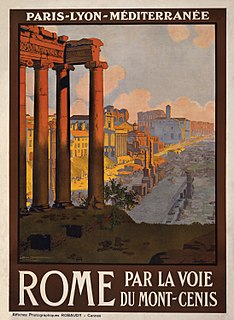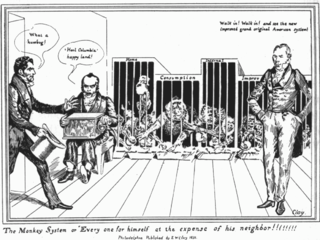A tariff is a tax on imports or exports between sovereign states. It is a form of regulation of foreign trade and a policy that taxes foreign products to encourage or period domestic industry. The tariff is historically used to protect infant industries and to allow import substitution industrialization.

Free trade is a trade policy that does not restrict imports or exports; it can also be understood as the free market idea applied to international trade. In government, free trade is predominantly advocated by political parties that hold liberal economic positions while economically left-wing and nationalist political parties generally support protectionism, the opposite of free trade.

Protectionism is the economic policy of restricting imports from other countries through methods such as tariffs on imported goods, import quotas, and a variety of other government regulations. Proponents claim that protectionist policies shield the producers, businesses, and workers of the import-competing sector in the country from foreign competitors. However, they also reduce trade and adversely affect consumers in general, and harm the producers and workers in export sectors, both in the country implementing protectionist policies, and in the countries protected against.

Pax Britannica was the period of relative peace between the Great Powers during which the British Empire became the global hegemonic power and adopted the role of a "global policeman".

The history of rail transport in France dates from the first French railway in 1823 to present-day enterprises such as the AGV.
The American School, also known as the National System, represents three different yet related constructs in politics, policy and philosophy. It was the American policy from the 1860s to the 1970s, waxing and waning in actual degrees and details of implementation. Historian Michael Lind describes it as a coherent applied economic philosophy with logical and conceptual relationships with other economic ideas.
The Tariff of 1816, also known as the Dallas Tariff, is notable as the first tariff passed by Congress with an explicit function of protecting U.S. manufactured items from overseas competition. Prior to the War of 1812, tariffs had primarily served to raise revenues to operate the national government. Another unique aspect of the tariff was the strong support it received from Southern states.

Sir William James Ashley was an influential English economic historian. His major intellectual influence was in organizing economic history in Great Britain and introducing the ideas of the leading German economic historians, especially Gustav von Schmoller and the historical school of economic history. His chief work is The Economic Organisation of England, still a set text on many A-level and University syllabuses.
The tariff history of the United States spans from 1789 to present. The first tariff law passed by the U.S. Congress, acting under the then-recently ratified Constitution, was the Tariff of 1789. Its purpose was to generate revenue for the federal government, and also to act as a protective barrier around newly starting domestic industries. An Import tax set by tariff rates was collected by treasury agents before goods could be unloaded at U.S. ports.

Until the early 19th century Germany, a federation of numerous states of varying size and development, retained its pre-industrial character, where trade centered around a number of free imperial cities. After the extensive development of the railway network during the 1840s, rapid economic growth and modernisation sparked the process of industrialisation. By 1900 Germany's economy had grown to be the largest in Europe, a factor that played a major role in its entry into the two World Wars. By the end of World War II, the country's economic infrastructure was completely destroyed. West Germany embarked in its program of reconstruction with financial support provided by the Marshall Plan and, guided by the economic principles of the Minister of Economics Ludwig Erhard excelled in the economic miracle during the 1950s and 1960s. East Germany's last remaining economic facilities were dismantled by the Soviet occupation force as the first step of the war reparations plan. The country was embedded in the Eastern Block system of socialist planned economy. Contemporary Germany is the largest individual economy and largest exporter in Europe with a GDP of 3.67 trillion USD in 2017.

The American System was an economic plan that played an important role in American policy during the first half of the 19th century. Rooted in the "American School" ideas of Alexander Hamilton, the plan "consisted of three mutually reinforcing parts: a tariff to protect and promote American industry; a national bank to foster commerce; and federal subsidies for roads, canals, and other 'internal improvements' to develop profitable markets for agriculture". Congressman Henry Clay was the plan's foremost proponent and the first to refer to it as the "American System".
The economic history of the United Kingdom deals with the economic history of England and Great Britain from 1500 to the early 20th century..

Protectionism in the United States is protectionist economic policy that erected tariff and other barriers to trade with other nations. This policy was most prevalent in the 19th century. It attempted to restrain imports to protect Northern industries. It was opposed by Southern states that wanted free trade to expand cotton and other agricultural exports. Protectionist measures included tariffs and quotas on imported goods, along with subsidies and other means, to ensure fair competition between imported goods and local goods. In today's age the US is still highly protectionist, according to Global Trade Alert the US has adopted over 1000 protectionist measures since the Global Economic Crisis in 2008, more than any other country since.

This article covers worldwide diplomacy and, more generally, the international relations of the major powers from 1814 to 1919. The international relations of minor countries are covered in their own history articles. This era covers the period from the end of the Napoleonic Wars and the Congress of Vienna (1814–15), to the end of the First World War and the Paris Peace Conference. For the previous era see International relations, 1648–1814. For the 1920s and 1930s see International relations (1919–1939).
The German tariff of 1879 was a protectionist law passed by the Reichstag that imposed tariffs on industrial and agricultural imports into Imperial Germany.

The French tariff of 1881 was a tariff passed by the National Assembly of the French Third Republic that became law on 7 May 1881.
The French tariff of 1885 was a protectionist law passed by the National Assembly of the French Third Republic that imposed tariffs. It became law on 28 March 1885.
The French tariff of 1887 was a protectionist law passed by the National Assembly of the French Third Republic that imposed tariffs. It became law on 29 March 1885.
French peasants were the largest socio-economic group in France until the mid 20th century.












